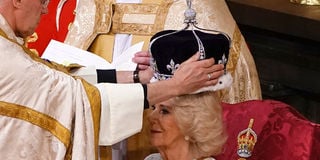Premium
From mistress to queen: Camilla's unbelievable life (and luck)

The Archbishop of Canterbury Justin Welby places a modified version of Queen Mary's Crown onto the head of Britain's Camilla, Queen Consort during the Coronation Ceremony inside Westminster Abbey in central London, on May 6, 2023, she will be known as Queen Camilla after the ceremony.
King Charles III's wife Camilla was crowned Saturday in Westminster Abbey, capping her public evolution from royal mistress to "queen consort" to queen in her own right.
Camilla, 75, was crowned by Archbishop of Canterbury Justin Welby moments after Charles's own coronation as sovereign of the United Kingdom and 14 other Commonwealth realms.
The set-piece coronation is the first in Britain in 70 years, and only the second in history to be televised.
Charles will be the 40th reigning monarch to be crowned at the central London church since King William I in 1066.
In the turbulent 1990s, Camilla was vilified as "the other woman" in Charles's marriage to his first wife, Princess Diana.
But she has slowly won acceptance -- if not adulation -- for her steadfast support for her husband and an unshowy dedication to good causes.
Although her popularity ratings remain lower than most other senior royals, she is increasingly seen by the public as a warm and down-to-earth figure.
Royal commentator Richard Fitzwilliams said the public now took a "benign view of Camilla" nearly three decades after Charles and Diana's very public separation and divorce.
The royal couple were "very, very well suited", being of a similar age and with a "similar sense of humour, similar friends", he told AFP.
"She was everything Diana wasn't, of course, but I think what has got across is that she is very supportive in a pretty quiet way."
- 'Quiet dignity' -
Since the death of Charles's mother, Queen Elizabeth II, last year, the causes Camilla has supported for years have been given a much bigger platform.
They include the arts, promoting literacy and supporting survivors of rape and sexual assault.
"She's been very low profile in the UK in recent decades. Now she has a moment to come more into the spotlight," said the former UK ambassador to France, Peter Ricketts.
Camilla is a "strong woman" and "a very warm person" who "believes passionately in her charitable convictions", he added.
One cause closest to her heart is the Royal Osteoporosis Society which she has been president of for more than 20 years.
Both her mother and grandmother died from the crippling bone-weakening condition.
"She has done a lot of good work (but) it's hard to know how much of that has permeated to the public," Fitzwilliams said, adding she had a "quiet dignity".
Camilla's improved press was largely a reflection of "the genuine person" rather than a reported palace spin operation aimed at making her more acceptable to the public as Charles's queen, he said.
The royal seal of approval for Camilla came last year when the late queen said it was her "sincere wish" that Camilla be known as Queen Consort after her death.
That finally put to rest suggestions she might instead hold the lesser title of Princess Consort -- something Charles had long fought against.
- Traditional upbringing -
Camilla Rosemary Shand was born in London on July 17, 1947, and had a traditional upbringing among Britain's monied upper classes.
Self-confident and attractive, she first met Prince Charles as a young woman at a polo match in the early 1970s, and they later became close.
However, believing Charles would never propose, she married British Army officer Andrew Parker Bowles in 1973.
The couple had two children: food writer Tom Parker Bowles and art curator Laura Lopes. She also has five grandchildren.
Later, as the royal marriage crumbled, Charles and Camilla rekindled their relationship. Camilla and Andrew Parker Bowles divorced in 1995, a year before Charles and Diana.
After Diana died in a Paris car crash in 1997, the couple made their first public appearance together in 1999.
- Windsor wedding -
They married on April 9, 2005, in a civil ceremony in Windsor, drawing a cheering crowd of 20,000 on the streets before a religious blessing.
Camilla has since been widely accepted by the royal family, including Charles and Diana's eldest son Prince William.
In his tell-all biography "Spare", published in January, their younger son Harry revealed that he and William begged their father not to marry his former mistress.
In the end, however, he said, they "pumped his hand (and) wished him well".
"We recognised that he was finally going to be with the woman he loved, the woman he had always loved," he wrote.





